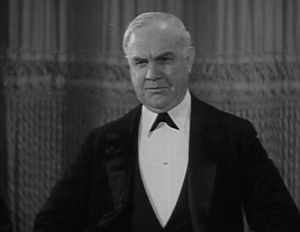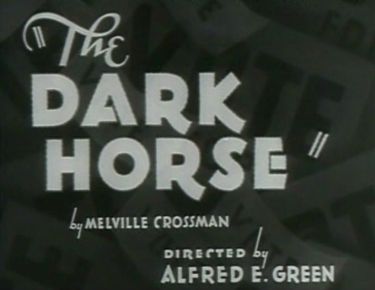The Dark Horse (1932), a goofy political satire, aired on TCM last November during their series of films about political elections. In Dark Horse, the Progressive Party of an unnamed state finds themselves deadlocked between two choices when nominating their gubernatorial candidate. The delegates who support one candidate get the brilliant idea to nominate a dark horse to split the vote, so they randomly select someone from the roster. The delegates who support the other candidate decide voting for the dark horse will help their candidate win — I confess I didn’t understand a bit of why either of their plans were supposed to work — and the inevitable happens: the dark horse candidate gets the nomination.
The dark horse candidate is Hicks (Guy Kibbee), a simple-minded goofball who doesn’t understand a thing about politics. Actually, the entire beginning of the film makes it clear that they have contempt for any “regular” people who are involved in the electoral process. Kibbee was portrayed as a hick, right down to giving him the name Hicks, and other delegates were shown in a short montage which specifically made fun of them being hicks and rubes as well. They were all stupid and all very intentionally meant to point out how bad our electoral system is when people like them can affect elections, them being farmers and such.
Hicks, and other delegates were shown in a short montage which specifically made fun of them being hicks and rubes as well. They were all stupid and all very intentionally meant to point out how bad our electoral system is when people like them can affect elections, them being farmers and such.
After the fiasco of nominating Hicks, the powers that be still want to win the election but fear it is hopeless. That’s when Kay Russell (Bette Davis) suggests a genius campaign manager she knows: Hal Blake (Warren William), who is currently in jail. They decide to bail him out and see what he can do to get Hicks elected.
Bette’s character Kay at first seems to be a campaign worker, but then she’s a secretary, then a low-level campaign manager. It’s very confusing, but this film is all over the place and never manages to settle down long enough to make sense. Bette, again, is put in a part that’s truly made for another actress. Her real personality is too confident and down to earth for a role that relegates her to little more than the pretty-faced, mandatory female interest. Further, in 1932 she made nine movies; between being so early in her career and being spread so thin, it is very easy to see why she couldn’t give her all in every film. Since she does so well in so many others from that year — Cabin in the Cotton, The Rich are Always With Us, and Three on the Match in particular — I’m very willing to forgive her weak performances. Another uninspired performance and film from 1932 is Hell’s House, by the way, coming soon to a Bette Davis Project near you.
Hal has nothing but contempt for Hicks, who is the target of the only halfway decent line of dialogue in the film: “Every time he opens his mouth, he subtracts from the sum total of human knowledge.” Again, this is funny but not fair, as Hicks is portrayed as more simple and silly than dangerously stupid.
Hal brings his own baggage into the political campaign by continuously dodging the law for not paying alimony to his ex-wife Maybelle (Vivienne Osborne). The ex-wife is, of course, a horrible shrew who doesn’t need the money and is harassing poor Hal who just doesn’t deserve this treatment. Except Hal spends a lot of time in jail, he rigs elections, he creates misleading news articles and publicity stunts for money. And, despite having this money and being legally obligated to pay alimony, no matter how “unfair” he thinks it is, he still won’t pay.
More evidence of Hal not being a nice guy is when he convinces Hicks to recite a speech written by a president (which one now escapes me) 100 years earlier and pass it off as his own at the big debate. Hal is only saved by the fact that the opponent Underwood (played by the ubiquitous Thomas Edison look-alike Berton Churchill) coincidentally reads the exact same speech first, and of course he humiliates Underwood about passing off another man’s speech as his own, as though it wasn’t what Hal himself was going to do.
Later, Hal finds out Maybelle is “seeing” Hicks on the side. He decides to trap Maybelle to get out of alimony, while at the same time rescuing Hicks from the inevitable scandal. Maybelle meets Hicks in a motel cabin across the state lines and the spend the night playing strip poker. Hicks, being dumb, loses every hand and is in his one-piece winter underwear when Hal arrives. Hal’s sidekick Joe (Frank McHugh) spirits Hicks out the back just as the police arrive. Hal, hoping to save the day, tries to pass Maybelle off as his fiancee, but the cops aren’t pleased with him violating the Mann Act,  so Hal marries Maybelle right then to keep from being charged with transporting a woman across state lines for sexual purposes.
so Hal marries Maybelle right then to keep from being charged with transporting a woman across state lines for sexual purposes.
You tell me how Maybelle is the whore in this situation, because that’s exactly how the movie plays it. The movie tells us it’s funny that Hal is marrying a woman he doesn’t love just to protect the Progressive Party’s dimwitted candidate, to stay out of jail, and to ultimately get his paycheck from the Progressives. A crabby woman who wants her legally-owed alimony and has sex with whomever she wants, well she’s the whore here, according to the film. To me, it seems like Hal is the real whore, but I’m not a shoddy B-movie from 1932.
As Joe hurries Hicks away from the cabin, we get the obligatory pre-code naughtiness: Hicks’ underwear gets caught on a barbed wire fence and the crotch rips. He also has a sheet around him, and Joe quips that if he’s spotted wearing a sheet, at least he’ll get the “KKK vote.”
Anyway, Kay — who you haven’t heard about during this summary because she doesn’t freakin’ do anything in this film — is upset that Hal married Maybelle when he was supposed to marry her. You don’t say. But then Hicks wins the election, and the film ends with Hal running to Reno for a quickie divorce. Pleasant.
I think this film was supposed to be a spoof of the problems of the electoral system: A stupid, inexperienced man can be put into office by the actions of a dishonest felon. But early WB films have this strange insistence on making the star of their show glamorous, likable and good, despite the actions of the character. Hal Blake is an asshole but Warren William is debonair, suave and lovable, for example, and it just doesn’t work here. It’s the same principle behind having female leads who are supposed to be old, ugly, ill, or wounded still look fabulous, or poor characters wearing expensive clothes and living in nice houses. Bette, of course, was known for being very willing to make herself look bad if the character called for it, which may be why I’m judging Dark Horse so harshly, because it seems Warners didn’t really have an excuse for undermining their own productions like this.
Bonus! “The Dark Horse” newspaper add from warren-william.com


Thanks for a nice long post!I saw this back in November because I never miss a Warren William movie. And he plays the patented Williams scoundrel here – he was also very busy in 1932! I do think your analysis is a bit harsh, because you are right – it's a spoof on elections and Populism vs Progressive politics. Despite rhetoric about serving the public, it's really about obtaining and maintaining power. Proof that things don't change! The film is a bit dated, just think about and enjoy it in the context of 1932.
Also, thanks for pointing out the Warren William blog.
Bette Davis and Warren William! That definitely sounds tempting.
Of the 4 collaborations between Bette and Warren, this is by far the worst. "Fashions of 1934" is much better as is "Satan Met a Lady", even though lots of people seem to hate the latter. Of course, "Three on a Match" is good, but I don't recall if they had scenes together. It's been easily 17 years since I've seen it.
Fashions of 1934 was great fun!
Or, you know, I could be a total spazz and forget that it was William Powell in "Fashions" and not Warren. D'oh.
I think you're taking the film a bit too seriously since it's a farce. I love Warren William and he was at his peak here, though I think Lee Tracy might have worked 1% better in this role. Blake's ex wife isn't painted as a villainess due to wanting alimony, though she's certainly irritating in the scenes demanding it. I thought that she would end up with Hicks as the state's first lady, thus getting rid of Blake's alimony and paving the way for his marriage to Bette's character. Then the film took the ex in the weird direction of having her try to frame Hicks for money, even though Blake was set to get 50,000 if Hicks won (which in theory should would get a piece of).